After the Cataclysm, Give the Surviving Haitians Strength and Hope
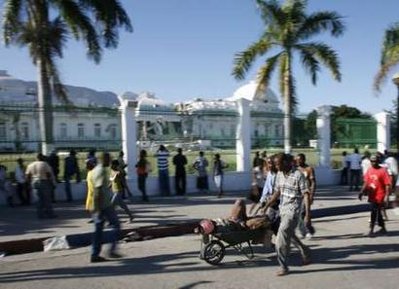
REUTERS/EDUADO MUNOZ
| Want to send this page or a link to a friend? Click on mail at the top of this window. |
| Posted January 29, 2010 |
|
After the Cataclysm, Give the Surviving Haitians Strength and Hope |
|
|
|
|
 |
|
|
REUTERS/EDUADO MUNOZ |
|
| Men carry an injured woman in front of the presidential palace after an earthquake in Port-au-Prince January 13, 2010. More than 250,000 people lost their lives in the major earthquake that destroyed the presidential palace, between 5,000 to 8,000 schools, hospitals and hillside shanties in Haiti. The initial base estimate of the monetary damages: US8.1bn. |
|
By YVES A. ISIDOR |
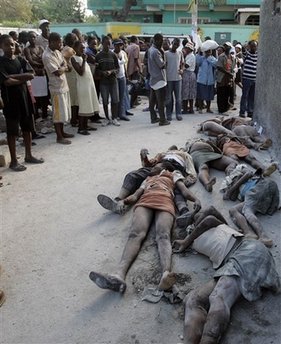 |
| Survivors of the earthquake look at the
bodies of victims on a Port-au-Prince Street
(Reuters Photo)
|
|
When it looks as if things cannot possibly get worse in Haiti, they do. |
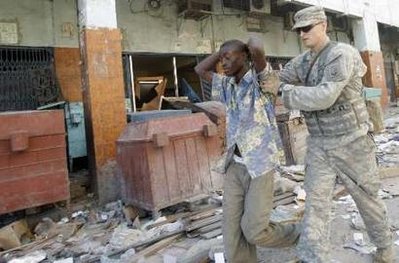 |
||
| A U.S. soldier arrests a suspected Haitian looter in Downtown Port-au-Prince, Haiti January 29, 2010. (Reuters//St.Felix Evens) |
| What Makes a Nation? |
|
What is the meaning of a nation if economics, institutions and development do not translate into the lives of the vast majority of citizens, in the positive terms, even if the collective optimal level of success achieved is determined to be de minimus? |
|
FOREIGN AID/REMITTANCES Over the past two decades, Haiti has received more than $5 billion in foreign aid. In 2006 alone, according to estimates forwarded March 7, 2007 by The Inter-American Development Bank Multilateral Investment Fund (MIF), Haitians living abroad sent a total of $1.65 billion to their homeland. Still, long before the earthquake it was fast becoming a lot more contagiously dirt-poor. |
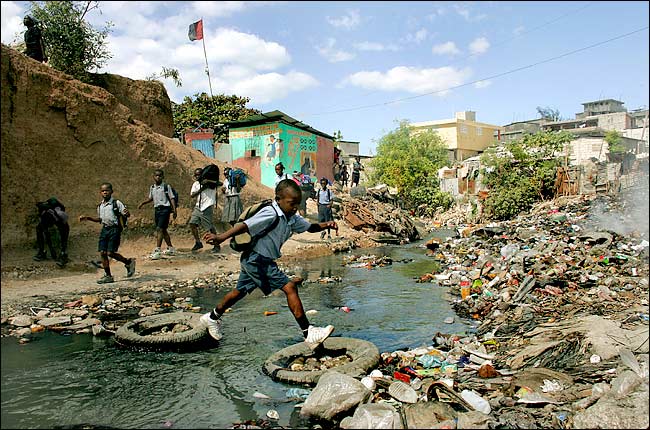 |
|
SCOTT NELSON/WORLD PICTURES NEWS, FOR THE NEW YORK TIMES - WEHAITIANS.COM, FILE |
| School children in the impoverished Cite Militaire neighborhood of Port-au-prince. |
|
ALLEGED
GRAND-SCALE PUBLIC CORRUPTION A few
months ago, US$197 million mysteriously
disappeared from Haiti's public purse - one of
the latest acts of public grand-thievery in the
dirt-poor Caribbean nation's government catalog
of economic crimes ( |
| Economy of Haiti |
|
| Policy Options: Some Basic Considerations, to, Hopefully, Help Shape the Long-Term Future of Haiti, in the Positive Terms |
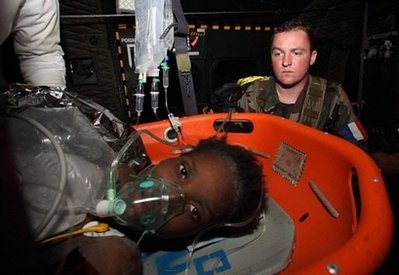 |
| Darlene Etienne, 16, leaves the French hospital to be airlifted to the Siroco, a French navy vessel after being pulled alive from the rubble of a building in Port-au-Prince by a French rescue team. Former US president Bill Clinton made an emotional appeal Thursday for the world not to forget Haiti, as doctors treated a 16-year-old girl miraculously pulled from the rubble of its killer earthquake.(AFP/FRENCH RESCUE SERVICE/Laurent Roch) |
| The Role of Cities |
|
|
|
|
Cities will increasingly become the main players in the global economy. - Kofi Annan, former secretary general of the United Nations and Nobel laureate for Peace |
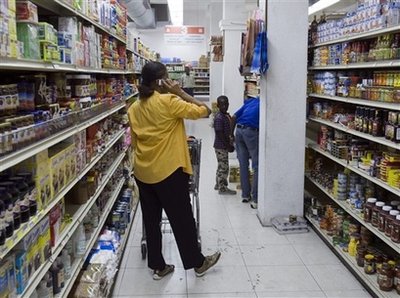 |
| A woman pushing a shopping cart speaks on her cell phone as she walks among the fully stocked shelves of the Star Market Wednesday, Jan. 27, 2010 in the upscale Port-au-Prince neighborhood of Petionville, a little over two weeks after the Jan. 12, 2010 earthquake.(AP Photo/The Canadian Press, Ryan Remiorz) More: Quake Accentuated Chasm That Has defined Haiti |
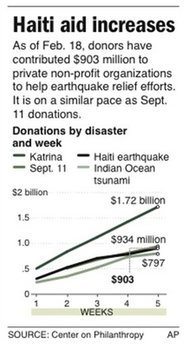 |
|
|
|
|
We have a collective responsibility to uphold the principles of human dignity, equality and equity at the global level. As leaders we have a duty therefore to all the world's people, especially the most vulnerable and, in particular, the children of the world, to whom the future belongs. - United Nations, Millennium Declaration, September 8, 2000 |
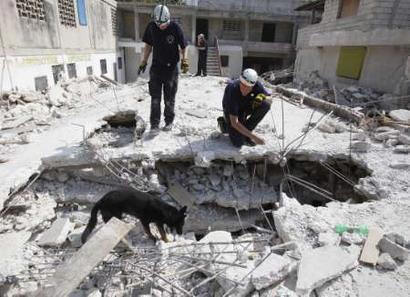 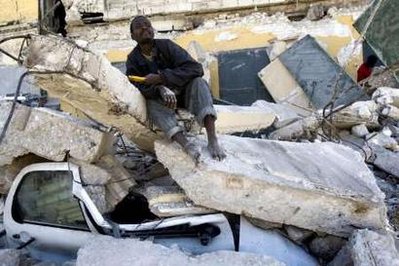 |
| More than 75 percent of Haiti's capital will
have to be rebuilt, after the devastating
earthquake that leveled swathes of the city, the
UN deputy special envoy for the stricken
Caribbean nation said Thursday. Envoy Paul Farmer revealed the extent of the damage to Port-au-Prince following the 7.0-magnitude quake on January 12 as he addressed the US Senate Foreign Affairs Committee in Washington. Asked by the panel's chairman Senator John Kerry how much of the city needed rebuilding, Farmer replied: "The majority of it. Seventy-five percent." Farmer called for a "recovery fund" to finance the reconstruction of the shattered country, and said the monies could be maintained by the Inter-American Development Bank or similar institution. "We need to commit funds and also to disburse them," the envoy said. "Such an account could be managed... with partners such as the UN and, of course, Haitian leadership... to design and implement recovery plans coordinated at central and local levels," he said, adding that the effort also would include the United States and other leading nations. The extent of the crisis is so "massive," he said, "that we need the international community. (AFP) AP Photos |
| Wehaitians.com, the scholarly journal of democracy and human rights |
| More from wehaitians.com |